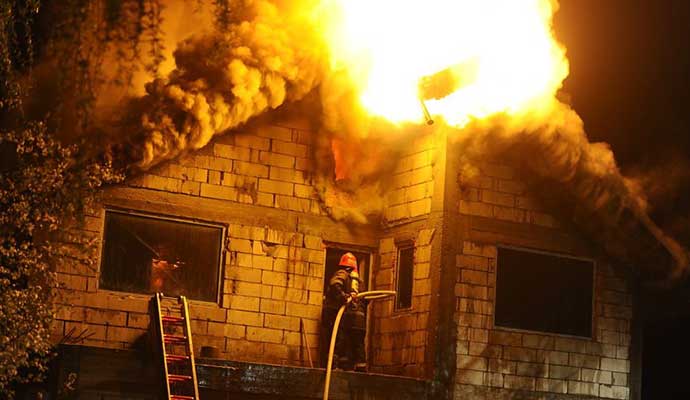“Following a devastating fire, Dayspring’s ability to pull resources from all over the state within hours was incredible. They had over 50 workers onsite within 2-3 hours! We would never have been able to have our students back in school within 2 days were it not for the quick response and the quality of work provided by them. Their quality of work was excellent!”
7 Tips to Prevent a Fire in Your Home During the Holiday Season

Fire prevention is especially important this time of year as holiday lighting adds to the potential of a home fire. The U.S. Fire Administration reports that fires kill more than 4,000 Americans each year and injure an additional 20,000. U.S. fire departments respond to nearly 2 million fires each year, and three-quarters of those fires occur in residences.
Dayspring Restoration knows first-hand the level of damage and suffering that home fires can have. So we’d like to share some important fire prevention tips to make sure your home is adequately protected from (and your family is prepared for) a fire. Here are 7 simple tips to help you avoid fires and reduce risk of injury should a fire occur in your home.
1. Install Check Smoke Alarms
Smoke alarms are a critical safety measure that provides protection by warning you and your family early so you can take the necessary precautions. The NFPA reports 85% of all fire deaths occur in the home. If every home had working smoke alarms, home fire deaths are estimated to drop 36%, saving more than 1,000 lives a year. With this in mind, we encourage you to follow these important smoke alarm guidelines:
- Install smoke alarms on every level of your home, especially near kitchen areas and hallways. They should also be installed in every bedroom.
- Depending on the square footage of your home, you may need to install multiple smoke alarms on each floor.
- Test all smoke alarms at least once a month. You can do this yourself by pressing the test button to make sure the alarm works. If your smoke alarms are wired together, holding the test button on one alarm will test all the smoke alarms at one time.
- Replace batteries in all smoke alarms twice a year. We recommend you change the batteries when the time changes in the spring and fall. Note that batteries in all wired smoke alarms should also be changed since these batteries will operate the smoke alarms during power outages.
- Replace smoke alarms every 8-10 years.
2. Avoid overloading circuits or extension cords
Fixed wiring, switches, receptacles and outlets accounted for 45% of fires, deaths and injuries, and extension cord fires outnumber fires started with attached power cords by more than two-to-one.
To prevent electrical fires, be sure that circuits and cords are not overloaded. For example, avoid overloading surge protectors. Also make sure cords and wires are never placed under rugs or in
high traffic areas. Avoid loose electrical connections by checking all plugs for a secure fit in the wall outlet. If the plug loosely fits, inspect the outlet right away. A poor connection between the plug and the outlet can cause overheating and can start a fire in minutes. If a plug is overheating, smells strange, shorts out or sparks, the plugged-in appliance or light should be shut off immediately, and then have the outlet inspected by a licensed electrician. Finally, be sure proper cords are used outdoors. They need to be rated for outdoors.
3. Regularly Inspect your Furnace, Heater, and/or Fireplace
Make sure there is ample space around the furnace or any portable heating unit. Anything that could catch fire should be at least three feet away. Inspect your chimney annually and use fire screens to help keep any fires in the fireplace.
4. Position Appliances Carefully
Keep entertainment centers, computers, kitchen and other electrical appliances away from windows with curtains. If there is a wiring problem, curtains can rapidly spread a fire. Additionally, keep appliances away from water sources (such as rain coming in from open or leaking windows), as this can help prevent wiring damage that can lead to a fire.
5. Clean Dryer Vents
Clothes dryers often start fires in residential areas. Clean the lint filter every time you start a load of clothes to dry or after the drying cycle is complete. Make sure your exhaust duct is made of metal tubing and not plastic or foil. We recommend that, at least twice a year, you clean the exhaust duct with a good quality dryer vent brush to prevent blockage and also check for lint accumulation behind the dryer.
6. Create An Escape Route and hold regular fire drills
Create and practice your escape plan with your family from every room in the house. Practice staying low to the floor and checking closed doors for heat using the back of your hand before opening them.
7. Be Careful Around the Holidays
If you fill your home with lights during the holiday season, keep them away from anything that can easily catch fire. Check all of your lights prior to stringing them up and dispose of anything with frayed or exposed wires.
Following these simple tips could potentially save your life or the life of a loved one. Pass this list on to your friends and family and make fire prevention count!














